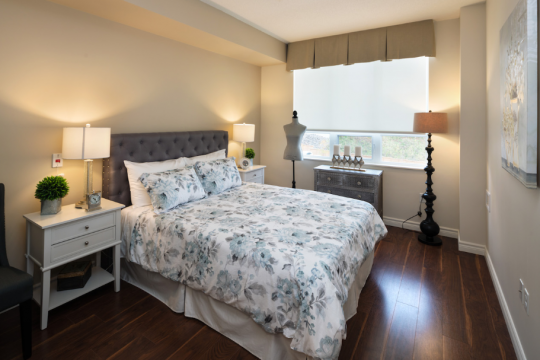
Do you have trouble sleeping? Adults of any age can have trouble sleeping caused by medical issues such as sleep apnea and snoring, underlying medical problems, insomnia, or restless leg syndrome. Beyond these sleep disorders, older adults may also have trouble sleeping because they produce less melatonin, a brain chemical that puts you into a deep sleep. Many older adults feel like they become light sleepers and wake up more easily than they did when they were young.
As a result of “light sleeping,” older adults may feel the need to go to bed earlier in the evening, making up for a lack of sleep by napping, or spend more time in bed. If you find you’re not sleeping enough and feel tired all the time, try out some of these sleeping tips for a better night’s rest.
#1 Develop a Bedtime Routine
Start carving out time before bedtime to follow a routine. Set a regular bedtime and devote a half-hour to an hour before then to follow a few bedtime rituals that will help you get to sleep sooner and sleep more soundly. When you go to sleep and get up at the same time every day, including weekends, your body gets used to it.
#2 Take Time to Calm Down
As part of your bedtime routine, take time to calm down and get into sleep mode before you go to bed. This can involve turning off screens well before bed. The blue light emitted by screens like TVs, laptops, and smartphones can suppresses the release of melatonin and delays the natural pattern of your circadian rhythm. Instead of screen time, read a book, listen to music, or do something else calming.
#3 Limit the Bedroom to Sleep
Make the bedroom an off-limits zone for work, TV, or using the computer. When you make the bedroom a sleep-only zone, just walking into your bedroom can help put you into “sleep mode.”
#4 Take a Bath
A warm bath before bed will both relax you and help you fall asleep. Slowing down and taking some time to clear your mind, read a book, and unwind can help you get ready for bed. Your body temperature will drop when you get out of the tub, too – something that signals to your body it’s time for sleep.
#5 Don’t Take Afternoon Naps
After a night of poor sleep, taking an afternoon nap is tempting, but sleeping during the day can push your regular bedtime back and lead to the same problems the next day, especially for older adults who tend to wake up earlier regardless.
#6 Keep Your Bedroom Dark and Cool
Limiting light sources (even digital clocks) and keeping the temperature down will help you sleep. Your bedroom should be a place where you feel comfortable. To find out about bedrooms in All Seniors Care suites, click here and find a retirement residence near you with more information about suites.
Different-sized suites are available at All Seniors Care Living Centres in Alberta, Manitoba, Ontario, Saskatchewan, and Quebec that will make you feel comfortable and that let you control your sleeping environment. Find out more about our suites and how you can take control of your sleep.